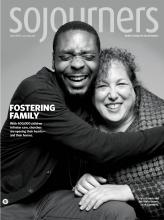FROM EGG FREEZING to genome analysis, desirous parents with sufficient funds these days have many choices for starting a family. But what about children born to parents who can’t care for them—at least not at the present time? With 400,000 children in foster systems across the United States and a quarter of them awaiting adoption, it is a pressing question.
Some evangelicals increasingly are taking their cue from a particular biblical passage in the first chapter of James, verse 27: “Religion that is pure and undefiled before God ... is this: to care for orphans and widows in their distress ...”
From this verse has come the “127 movement,” dedicated to supporting prospective foster families within a church community. Project 1.27 in Colorado was the first group founded under this banner back in 2004. Its goal was to provide the state-mandated orientation and training, from a Christian perspective, to potential foster parents. If a family ended up fostering or later adopting a child, then the movement’s members would serve as a support network.
“We had 875 legally free kids waiting to be adopted in Colorado and twice that many churches,” recalled Project 1.27 director Shelly Radic. “We thought, ‘Wow, that’s just not right,’ so we began to build relationships with county social services and child services at the state level, and then connect with churches and private agencies to set up training.”
Since foster systems are run by individual states, so too are these faith-based support movements.
“We do recruiting, orientations, and training. We’re not a placement agency,” explained Radic. “We follow state guidelines, invite people to come who might be interested in foster care and adoption, tell them about the trauma and the hard things the children may have experienced, help families see what their process would look like, and talk about building a support team as a high priority.”
Read the Full Article
